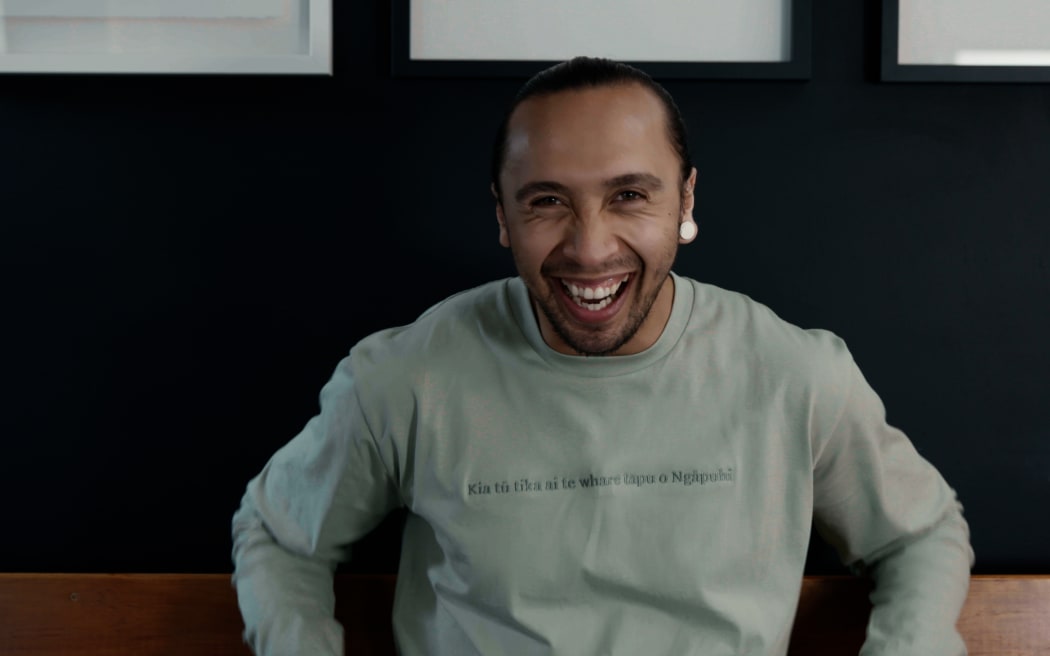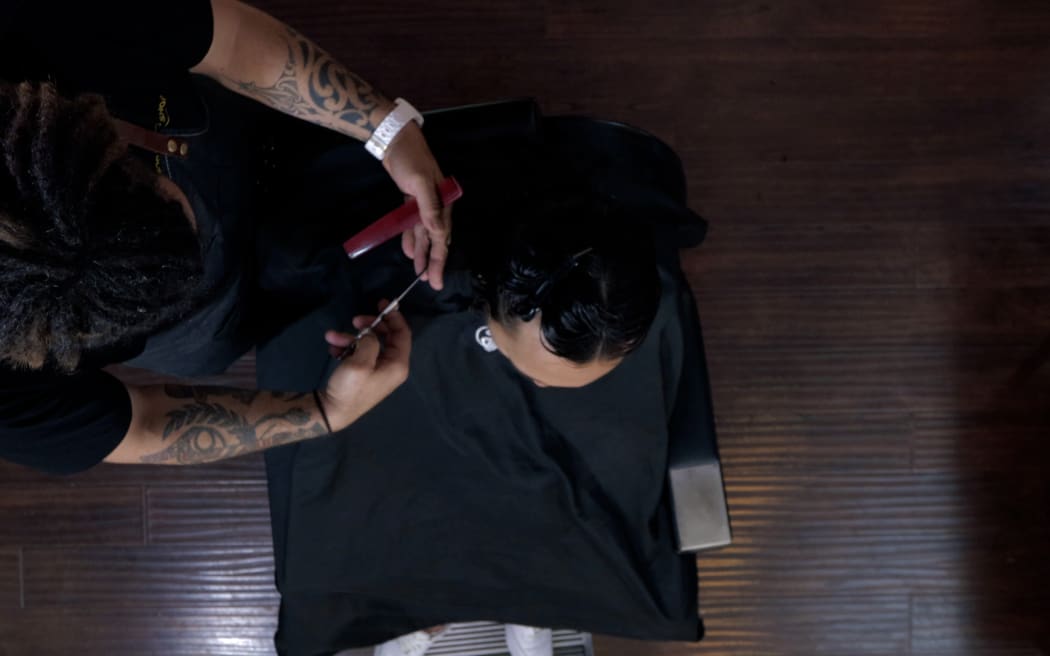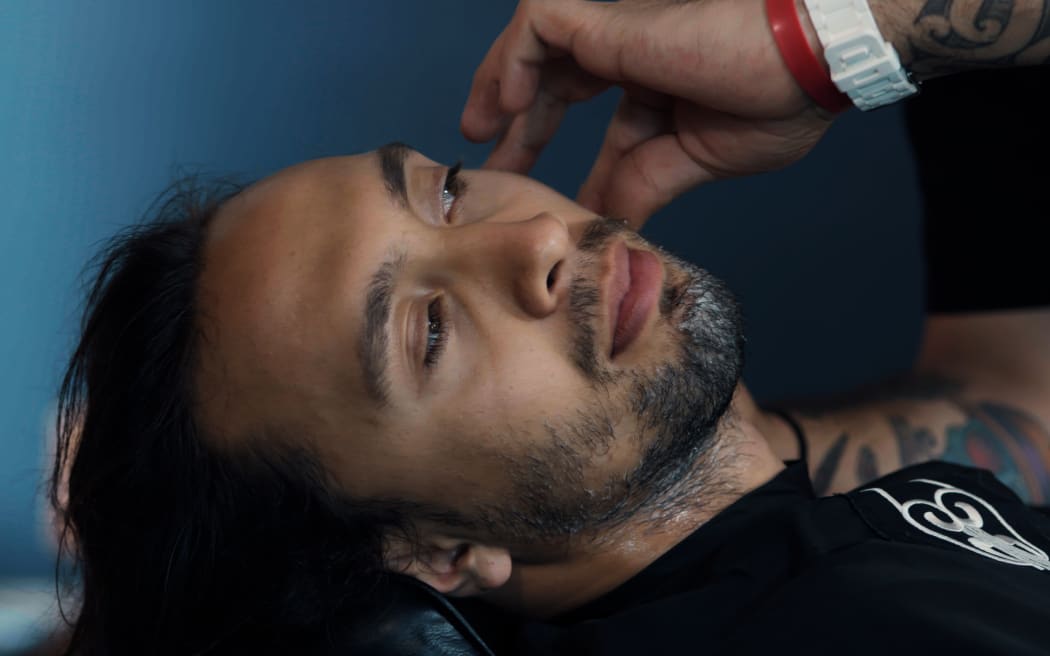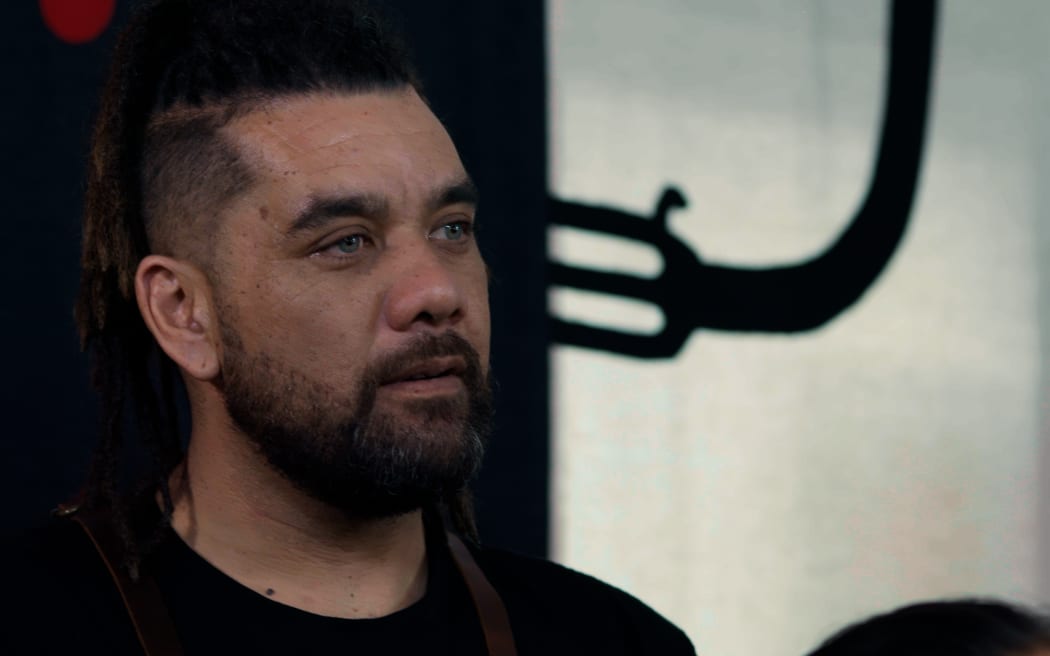Series Classification: PG (Parental Guidance) | Watch the series here | Visit TAHI
Kīngi wants to grow his hair long, so he’s in Chop's chair for a trim and a shave. He strikes up a conversation with Papa Hemi, a kaumatua who sits in the Chop Shop awaiting a shave. He and Kīngi talk about tomo (arranged marriage) and the reasons their ancestors practiced this tikanga.
Kīngi reveals that he tried to arrange his own marriage. He shares the lessons his old people taught him and his memories of growing up in Hokianga – going to the marae, church, and playing rugby. But now, he’s going through a transition away from Christianity to more authentic Māori incantations.
He shares with Papa Hemi and Chop the impacts colonisation is having on him and his generation, who were not hit for speaking the language but who find themselves teaching those who were.

Kīngi waits on the barbershop bench for his cut with Chop Photo: Tai Huri Films / Adam Jones
Scars on our Hearts
For me and my generation, you can’t see the bruises on our backside or on our hands because of the reo… The scars are on our hearts and they feel like open wounds.
According to Kīngi Rākete-Tane te reo Māori, home life and tikanga are one and the same. He’s grown up with many concepts that are normal for whānau Māori in Te Tai Tokerau. Sown from the seeds of rugby, marae and church his path took him as far as the NFL to play rugby league across the ditch at the age of 16, but it wouldn’t be long before injuries got in the way of becoming a superstar league player.
However, there was a deeper reason his league career didn’t work out for him. A yearning for his homeland resulted in Kīngi becoming homesick, he missed that sense of belonging he felt when he was at home.
I came back home and when my feet touched the ground that sense of belonging came back. I was grounded again. My language wove me back into my environment.

Kīngi is just in for a trim today Photo: Tai Huri Films / Adam Jones
Kīngi is a gifted teacher of te reo Māori in Kaikohe, and his students, many who are whanaunga (relatives) fill his classes each year. He even taught his own mother to speak te reo. Although he has not suffered the impacts of colonisation directly, he says he’s seen the effects of it in his mahi.
I still see it and I’m teaching the ones who were affected heavily by colonisation therefore I feel a lot of that, I bear some of that hurt too.
But deficit thinking is not for Kīngi, he’s too busy focused on preserving the ancient practises of his tūpuna and ensuring that Ngāpuhi dialect remains strong within its descendents. These days the church is not as prominent for Kīngi, what remains is the marae, language, and a new generation who are wanting to turn back to te ao kōhatu (the ancient world).
I think I’m going through a funny transition. Because all we knew when we were little was marae and church. And now that I’m at the age I am at now it’s more Authentic Māori incantations to Tūmatauenga, Tāne, Rongo, Ranginui, Papatūānuku.

Kīngi reclined for a razor shave Photo: Tai Huri Films / Adam Jones
Kīngi is passionate about the dialect and the northern nuances of te reo Māori, he believes the reo won't die up here.
The dialect here is very important, and we need more kaiako to meet the demand for growing the language. I've seen a change of the lost generation reclaiming te reo and tikanga. It's a heavy weight on us to bridge this situation and it's very challenging because the kura kids are now the teachers and the old people are the learners.
With a number of language initiatives within Ngāpuhi, Kīngi knows the future of the language is in good hands.
Another practice Kīngi wants to revive is tomo, the ancient practice of arranged marriages. This Māori concept was something his father would joke with him about as a young fella.
Son, I'm gonna tomo you to the takeaway owner's daughter – that was his little joke since way back. That was my dad's kaupapa for me, to get tomo’d. And I think at first it was a bit of a joke, but I also think there was a reason behind him talking like that to me.

Chop takes a moment to listen to Kīngi's kōrero Photo: Tai Huri Films / Adam Jones
Papa Hemi, another customer sits on the bench and listens intently to Kīngi’s kōrero. He adds his whakaaro to the discussion.
Kīngi, in my day, I never wanted my marriage to be arranged because of how my relations looked. So I decided that I wouldn't marry them. That’s how it was growing up. We’d marry each other to regain some of those wider connections.
Their conversation spans generations as the two of them compare grassroots stories and experiences. In these moments, both Kīngi and Papa Hemi find that although there are 40 odd years between the two of them their values remain the same. Here is an authentic example of intergenerational relationships within te ao Māori.

Photo: supplied

